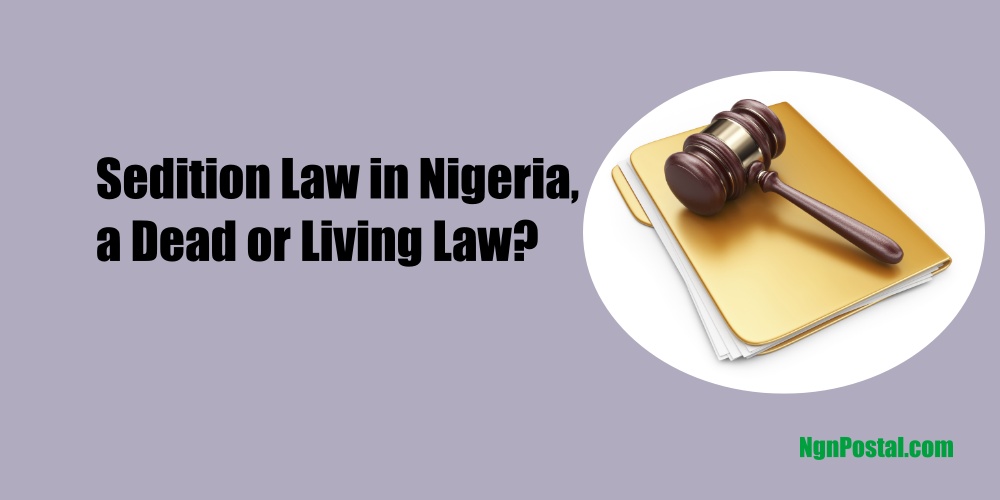There is a divergent argument on the offence of sedition. One is of the view that sedition as an offence is still part of our statute book; while the other seems to suggest that it has been eroded and overtaken by the Liberty and democratic modern state. Curiously, either of the opposing postulations rightly or wrongly portrays the level of freedom of expression in Nigeria as sanctioned in the constitution.
The former view, for instance, is premised on the argument that a grant of the right to speech by the Constitution is not a license to inflame society with disorder and disaffection. Approval of this line of argument can be seen in the celebrated case of Chika Obe v DPP. Where Ademola C.J. F reasoned that the right to freedom of expression provided for in the constitution should not be narrowly interpreted as to exclude seditious speech or publication, this contention that sedition is a living law is a testimony of the legal adage that the king shall do no wrong and thus Nigeria, like its British Colonial Lord, must retain within its systems, sedition law to preserve and enhance the status of the head of government.
The overall decision, in this case, appeared to have overturned the Supreme Court ruling in Chike Obi’s case. Chike Obi’s case. Chike Obi’s case was based on the 1960 parliamentary constitution. And since Nigeria is no Longer in parliamentary government the decision in Chike Obi is no longer relevant.
However, it should be reckoned that the provision of sedition in both the penal and criminal codes respectively has not been expunged or repealed. However, the better view we believe is to amend our statute books on the offence of sedition. This is not only a revalidation of our Independence; it is civilized in the interest of democratic ideas.
The amendment of the affected section is to indicate circumstances that make sedition justifiable in our society and when it ceased to be so given our national democratic status. To achieve that, section 50 of the criminal code should be redrafted to delete the words ‘Hatred’ ‘Contempt’ disaffection because they are general words of intention that can be manipulated by an overzealous government, president or governors to intimidate or settle scores with opposition. This has the effect of stifling the right of expression guaranteed by the Constitution.
One must observe that for the reason of ill-draft and likelihood of abuse as manifested above in the case of section 50 of the criminal code, sections 416, 417 and 419 of the Northern penal code should be amended in like manner, in their place, section 50 of the criminal code as suggested to be amended above, along with current section 51 of the criminal code, should be introduced into the Northern penal code as the applicable Law on sedition.
Courts’ jurisdiction As Affecting Fundamental Rights
By Section 251 of the 1999 Constitution of the Federal Republic of Nigeria, the Federal High Court has exclusive jurisdiction on matters affecting the Federal Government or any of its Agencies. As a result, the hitherto unlimited jurisdiction of the State High Court to entertain matters involving an infringement on the Fundamental Rights of citizens was circumscribed. An action for the enforcement of Fundamental rights cannot be maintained against the Federal Government or any of its Agencies in the State High
Court.
Identifying the party to be sued is now a very important consideration, which may determine the Court where the action is to be instituted.
The inherent problem with this requirement is that Federal High Courts are very sparsely spread across the States of the Federations, various States do not even have Federal High Courts, and Litigants will have to travel far distances at enormous expenses to institute actions in the nearest Federal High Court covering their locality. Even where the action can be filed in State High Court, most States High Courts are rooted in the cities, very few of the 774 Local Government Headquarters in the Country can boast of a High Court and again, most are within the cities, so that Litigants must bear the financial burden not only of the transportation and Legal Fees of their solicitors but themselves to the nearest court to enforce their rights.
The result is that various cases of infringement of rights do not get to the courts at all. One of the primary aims of the Fundamental Rights Procedure Rules is to expedite the disposal of Fundamental Rights Cases, what is the essence of speedy disposal of a suit if adverse economic factors prevent prospective Litigants from seeking redress for infringement of their rights? Although there is a Constitutional provision for Legal Aid as an obligation of the Government this is rarely provided and only in Criminal Cases. Redress for breaches of Fundamental Rights in most cases, if not all, take the form of civil wrongs.
See Also: How to Find Your Postal Code in Nigeria.
